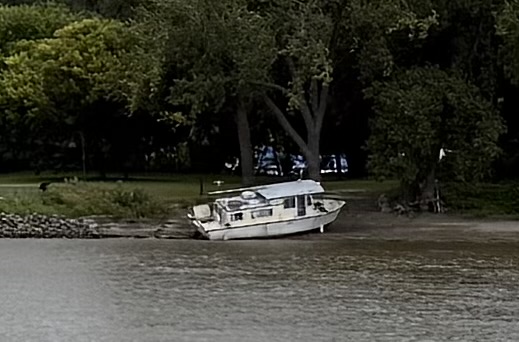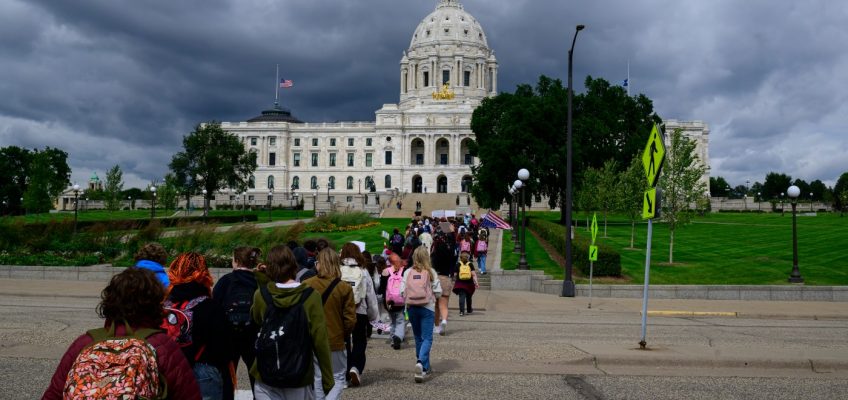Gov. Tim Walz said he still plans to move forward with a special session on gun control after last month’s deadly violence at Annunciation Catholic School in Minneapolis, even if Democratic-Farmer-Labor and Republican leaders can’t reach an agreement on legislation ahead of time.
Senate and House leaders from both parties met with Walz on Tuesday to discuss what types of legislation they might pass if the governor calls them back to the Capitol in the coming months.
Gov. Tim Walz. (John Autey / Pioneer Press)
Any bills that reach Walz’s desk to be signed into law will require bipartisan support, and the Legislature is narrowly divided.
DFLers want a ban on so-called assault weapons and limits on the size of magazines, while Republicans have made proposals including security funding for private schools and more state money for mental health resources.
The parties so far have not reached any agreement on what a special session might look like, and legislative Republicans have so far resisted calls for new gun control laws.
Walz: ‘I feel a sense of urgency’
Speaking with reporters at the Capitol after a short meeting in the governor’s cabinet room on Tuesday, Walz said Minnesota needs to act to restrict access to firearms after August’s school shooting, which killed an 8-year-old and a 10-year-old, and June’s assassination of former House Speaker Melissa Hortman and her husband.
“I feel a sense of urgency, I think Minnesotans feel a sense of urgency,” he said. “The public is asking us to do something … I will call the special session one way or another.”
Walz said he didn’t want to speculate on when exactly he might call senators and representatives back to the Capitol, but that he wanted to do it “sooner than later.”
GOP response
It will be impossible for one party to act alone, House Republican Leader Lisa Demuth noted after the meeting. She called the discussion “productive,” but did not signal that her caucus was interested in any of the DFL gun control proposals.
“I think this is a conversation that needs to take place,” she said. “Whether or not we can accomplish actual, meaningful change in a special session or not is yet to be seen.”
The House Republican Caucus outlined its special session priorities last week after news emerged of Walz’s plans.
Besides funding for security at private schools and funding mental health resources, Republicans said they also hope to stiffen criminal penalties for repeat gun offenders and people who buy guns for ineligible individuals who end up committing a crime.
“House Republicans are committed to making sure that we are keeping our schools and our communities safe … and getting at the actual foundational root issues that cause someone to act out in such an horrendous way,” Demuth said.
Demuth said Democrats have told her they don’t have enough votes to pass an assault weapons ban or magazine capacity limits.
Special elections
With one vacant seat, the House is divided 67-66 with the Republicans at a one-seat advantage.
That likely will return to a 67-67 tie after a Sept. 16 special election to succeed Hortman.
Two vacancies in the Senate have left DFLers holding 33 seats to Republicans’ 32.
Special elections for those vacancies this November could change the balance of power or preserve the DFL’s one-seat majority.
But right now, they still need 34 votes to pass any bills.
If a special session were to happen right now, DFLers would need one Republican vote in both chambers to get any bill to the governor.
Walz called discussions outside restricting semiautomatic weapons a “distraction” from the central issue — that the wide availability of weapons with features like pistol grips and detachable magazines is the main cause of high-casualty spree shootings in the U.S.
New House DFL Caucus leader Rep. Zack Stephenson, who was elected by his fellow Democrats Monday to succeed Hortman, tied the moment to the debate.
“The reason why I’m standing before all of you right now is because of the lack of doing,” he said.
Possible DFL holdouts
DFLers failed to pass an assault weapons ban when they controlled state government from 2023 to 2025. Though they enacted new laws, including universal background checks for gun sales and a so-called red flag law allowing a court to order people to give up guns if they’re deemed a danger to themselves or others.
At least one northern rural senator could still be a holdout on gun bills.
Sen. Grant Hauschild, a Hermantown DFLer who represents northeast Minnesota’s Arrowhead region, voted for extreme risk protection orders and universal background checks. But he and other DFL senators, including Rob Kupec of Moorhead, would not support any other gun bills.
Asked about potential holdouts in her caucus, Senate Majority Leader Erin Murphy, DFL-St. Paul, said she believed that recent tragedies might persuade them to vote differently than they would have a year or two ago.
“Life’s circumstances intervene and can change hearts and minds,” she said.
Before a special session on guns, the DFL-controlled Senate plans to convene a series of special “working group” hearings to hear testimony and consider various proposals. Murphy said the meetings will be open to the public.
They’re set to meet Sept. 15 and Sept. 17. Demuth said the House will hold similar meetings before a special session.
Rep. Zack Stephenson succeeds Melissa Hortman as House DFL caucus leader
Joe Soucheray: To keep each other safe, we’ll ‘pray with our feet’
Letters: Any law short of banning all semi-automatic weapons would be pointless. Instead …
Doherty, Thiemann: Let’s approach the gun argument differently this time
Minnesota State Auditor Julie Blaha won’t seek reelection




